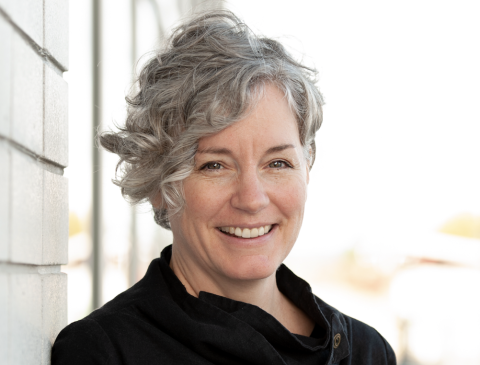As a social worker for many years in various settings, Dr. Carmen Lavoie has supported people at end-of-life.
Her work became personal in 2020, when she was diagnosed with cancer.
“I was catapulted into understanding death and my own end-of-life,” she says.
Now, as a Nanaimo Hospice volunteer in the Palliative Care Unit, Carmen has come to a “deeper understanding” of how individuals and their support network can be guided through the end-of-life experience. A social work professor at Vancouver Island University since 2014, she uses that profession’s lens to guide her work.
“I believe the discipline of social work brings an important knowledge base to help define and guide this work,” she adds.

To further define and guide this work, Carmen is launching VIU’s first end-of-life doula course. Her goal is to develop a full program that prepares students to work with people who are dying and their support network. The course will be running for the first time this September and registration is currently open.
Here’s what she says about this unique role and the new course at VIU.
What exactly is an end-of-life doula?
There are several alternative names for end-of-life doulas like death doula, death midwife, death coach and end-of-life coach. According to the International End-of-Life Doula Association: “End-of-life doulas provide companionship, comfort and guidance to those facing a terminal illness or death. Our non-medical holistic support encompasses emotional, spiritual and practical care. We offer resources to help the dying person, along with their family and loved ones, to make informed decisions in a supportive environment.”
How does this role support someone in the final stage of someone’s life?
This role supports people and their networks in several ways:
- Normalizing death and death care by creating spaces in which there is compassion, respect and understanding.
- Supporting communication among individuals and their support network.
- Support for death planning, which ensures autonomous decision-making.
- Guiding individuals through the emotional, cultural and spiritual aspects of the end-of-life experience.
What sort of duties and roles might an end-of-life doula be responsible for?
- Compassionate listening and communication focused on bringing ease and empowerment.
- Support in finding resources, services and completing relevant documentation.
- Planning and coordination of end-of-life wishes, such as ceremony.
- Help with communication among those involved.
- Accountability to a code of ethics and legal obligations.
- Attending to issues of equity and inclusion in end-of-life services.
- Self-awareness and reflection to ensure proper boundaries and self-care.
How does someone become an end-of-life doula?
There is currently no regulation of the EOL Doula role, nor standardization of education in Canada or elsewhere. Education is largely driven by private organizations, with few exceptions. The Canadian Association of EOL Doulas is a member organization and does not provide any accreditation for post-secondary courses. VIU is offering one of two courses in BC and offers the only program on Vancouver Island.
Who should take VIU’s end-of-life doula course?
This is an introductory course so it is appropriate to anyone who is committed to support others through end of life and is drawn to compassionate, heart-centered practice that is respectful of others’ end of life choices.
What will people learn about?
Key learning outcomes for the course include:
- The dying process;
- The experience of grief and loss;
- Principles of empowerment practice;
- Key communication skills;
- Ethical, legal and cultural context; and
- Social justice and equity at end of life.
Are there particular characteristics that would be advantageous for a person considering this sort of work to possess?
Because individuals at end of life are typically highly vulnerable, one priority is to ensure our practice is ethical and that we support individual autonomy and empowerment. As a result, it is important an EOL Doula be comfortable with self-reflection and not imposing their own values and beliefs on others.
This role would benefit from having individuals from a wide variety of backgrounds, just as in social work, as it strengthens our understanding of practice and ensures the role is able to respond to individuals from varied backgrounds.
Why is proper training important?
Education is important because in Canada we live in a largely death-phobic society. Grief is often understood as something to contain or “get over.” Furthermore, the dominant culture does little to equip us to understand end of life or how we might support individuals. This is astounding considering it is the one thing we all have in common; we all are going to die. The COVID-19 epidemic has brought all this to the forefront and shown us we need to normalize grief and loss as well as the dying process. We need to bring it out of the shadows so that we may honour those who are dying as well as support others in the grieving process.
